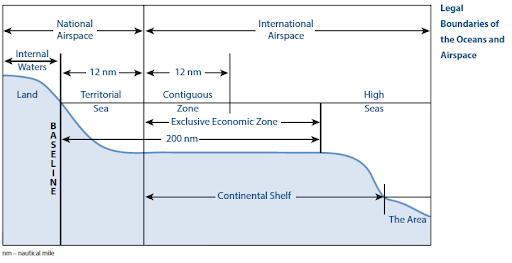UNCLOS
About UNCLOS
-
- The United Nations Convention on the Law of the Sea (UNCLOS), also known as the Law of the Sea Treaty, is an international treaty which was adopted and signed in 1982. The Convention was formed to ensure freedom of shipping navigation at the sea.
- The Convention has created three new institutions on the international scene :
- the International Tribunal for the Law of the Sea,
- the International Seabed Authority,
- the Commission on the Limits of the Continental Shelf.
- India is a party to UNCLOS.
- UNCLOS classifies marine areas into five zones. They are:
- Territorial sea
- Contiguous zone
- Exclusive economic zone
- Continental shelf
- High Sea

Territorial sea
- According to UNCLOS, the territorial sea can be defined as the area which extends up to 12 nautical miles from the baseline of a country’s coastal state. The territorial sea is under the jurisdiction of that particular country; however, foreign ships (both merchant and military) ships are allowed passage through it.
- This type of passage of territorial passage of foreign ships is known as an innocent passage. However, the right to the innocent passage can be suspended if there is a threat to the security of the coastal state.
Contiguous Zone
- The contiguous zone can be defined as the belt which extends 12 nautical miles beyond the territorial sea limit.
- A coastal state’s control on this area is limited to prevention of actions which can infringe its customs, fiscal, and immigration laws. It can also act if any activity in the contiguous zone threatens regulations in the territorial sea.
Exclusive economic zone
- The exclusive economic zone can be defined as a belt of water which extends up to 200 nautical miles from the baseline of the coastal state. Thus it includes both territorial sea and contiguous zone.
- The exclusive economic zone provides the coastal state control over all economic resources such as fishing, mining, oil exploration, and marine research.
- The coastal state also has jurisdiction regarding protection and preservation of natural resources and marine environment.
Continental Shelf
- The continental shelf can be defined as the area whose outer limit shall not exceed 350 nautical miles from the baseline or shall not exceed 100 nautical miles from the 2500 meters isobath.
- Isobath is a line connecting points of equal underwater depth.
- The coastal state has exclusive rights for exploring and exploiting its natural resources in this area. The state also has the exclusive rights to authorize and regulate drilling on the shelf for all purposes.
High Seas
- High seas can be defined as the part of the sea that is not included in the exclusive economic zone, in the territorial sea, or in the internal waters of a coastal state or archipelagic waters of an archipelagic state.
- High seas are open to all states for freedom of navigation, freedom of overflight, freedom to construct artificial islands installation, freedom of fishing, and freedom of scientific research.
Why in News?
- In a bid to regulate foreign ships, China has notified new maritime rules warranting vessels carrying radioactive materials, bulk oil, chemicals and a host of other supplies to report the details of the cargo upon their entry into Chinese territorial waters.
- The new rules are expected to increase tensions if China strictly enforces them in the disputed South China Sea.
- Beijing claims almost all of the 1.3 million square-mile South China Sea as its sovereign territory under a so-called “nine dash line”. China has been building military bases on artificial islands in the region also claimed by Brunei, Malaysia, the Philippines, Taiwan and Vietnam.
- Over $5 trillion trade passes through the South China Sea, and 55% of India’s trade passes through its waters and the Malacca Straits, according to estimates by India’s Ministry of External Affairs (MEA).
‘Nine dash line’
- The “nine dash line” is deemed by most countries as being inconsistent with UNCLOS, which only gives states the right to establish a territorial sea up to 12 nautical miles.

- The requirements of the latest notice will also be seen as being inconsistent with UNCLOS, which states that ships of all countries “enjoy the right of innocent passage through the territorial sea”.
Reference:
Subscribe
Login
0 Comments
